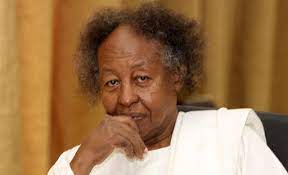By Paul Nicholson
March 16 – Just four days after Patrice Motsepe took the leadership of CAF and two days after FIFA’s Veron Mosengo-Omba was shifted from Zurich to CAF as its General Secretary, their first ethical challenge concerning an African member association has arisen.
A letter sent to Sarah Solemale, senior manager, governance services at FIFA, alleges that Sudan FA president Dr Kamal Shaddad (pictured) of “major and continuing violations of both the FIFA and SFA statutes.
The letter, from Dr Muzamil Abu Elgassim Hussain, publisher of the Alyoum Altali daily newspaper in Sudan, claims that Shaddad has “illegally hampered the constitution of both the Ethics Committee and the Audit & Compliance Committee”.
It is a particularly awkward complaint for FIFA so early in Motsepe’s regime. FIFA president Gianni Infantino visited Sudan as part of his African tour prior to the election where he met with Abdel Fattah al-Burhan, the chairman of the Transitional Sovereignty Council, and made various promises to invest in the country. He also met with Shaddad and asked for the support of Motsepe, according to local reports.
Infantino promised “that FIFA will work closely with the whole football community in Sudan, with women and men, to continue to develop football and to bring Sudan back where it deserves to be, at the top of African football.”
“I was saddened when I visited Khartoum Stadium and witnessed its current state,” he said.
“This is an historical venue and we need to protect and cherish its history. We will invest and work together with the government and the SFA to make everyone in Sudan proud of the stadium again.”
To be facing an ethics complaint so soon after the intense FIFA politicking around the positioning of Motsepe as the head of CAF and just three weeks after Infantino had made his promises in Sudan, once again raises questions over the backroom deals done by FIFA to get their people into position in Africa.
The ethics complaint against Shaddad says the “violations seriously compromise the realization in the Sudan of FIFA goals articulated in Article (2) para. (g) of the FIFA Statutes: “to promote integrity, ethics and fair play with a view to preventing all methods and practices, such as corruption, doping or match manipulation, which might jeopardize the integrity of matches, competitions, players, officials and member associations or give rise to abuse of association football.”
Hussain also pointed to a TV interview from 2018 in which Shaddad indicated that he will decide the rules and regulations of the Sudan FA, rather than the FIFA statutes that make obligatory requirements of its members for them to be able to be members and collect their grants.
“Dr. Shaddad dared to say that, he is solely responsible for hampering the constitution of the SFA Ethics Committee alleging that he knows what’s best for the Association and that the committee would be useless as its concept and functions does not go in line with the culture, norms, identity and values of the Sudanese Society!” says the Hussain complaint.
The point being that the interview, though held in 2018, flagged a serious governance intent that was outside FIFA’s rules and that should have been hard for FIFA to ignore. The fact that more than two years later the complaint says that the SFA has still not established any of the committees required by FIFA should have been a clear red flag to the world governing body. Instead it appears that it could have provided a more murky opportunity.
“…the SFA governance system is riddled with the lack of key committees (Ethics/Audit & Compliance) to provide a stronger layer of neutrality and scrutiny and dominated by a President behaving in a way that conflict with the goals of SFA, resulting in the violation of the provisions of its Statutes,” says Hussain in his complaint.
“You will note that as a matter of fact, that there is no Code of Ethics/Electoral Code drafted and/or passed since the adoption of the SFA Statutes on 14 September 2017!” says Hussain. Clearly this is not a new issue, even before the TV interview.
Sudan has a proud footballing history. It was a founding member of the Confederation of African Football (CAF) and hosted the first-ever Africa Cup of Nations in 1957. The country achieved impressive results in the 60’s and 70’s before falling by the wayside. It is the talent in the country that Infantino wants to reignite, but the question is really whether that is secondary to ensuring Sudan is on-message with what he needs from Africa.
“We spoke with the Chairman of the transitional sovereignty committee about investment in football, because there is incredible talent in the country to be developed,” said Infantino when he was Sudan last month. “We spoke about football being part of the school system and about women’s and girls’ football – a very important area of the game.”
It appears they didn’t speak too much about ethics, federation laws and statutes, and how football and money from the world governing body should be administered by a member association.
Contact the writer of this story at moc.l1745644431labto1745644431ofdlr1745644431owedi1745644431sni@n1745644431osloh1745644431cin.l1745644431uap1745644431

